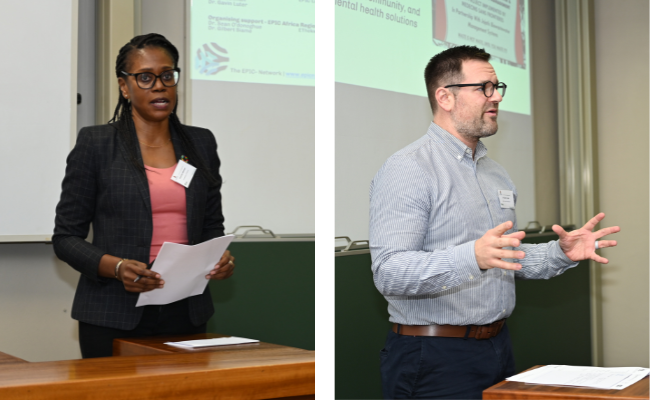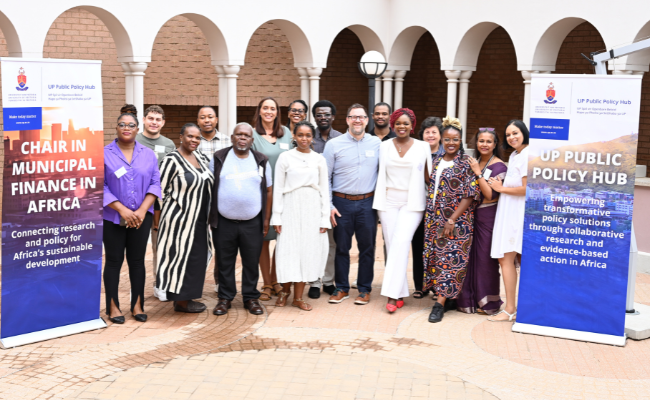The University of Pretoria's (UP)
Public Policy Hub (PPH) hosted the EPIC-Africa 2025 City Training Workshop on 12 February 2025, bringing together academics, city officials and community leaders to explore innovative solutions for urban and municipal challenges in South Africa. The workshop introduced the Educational Partnerships for Innovation in Communities – Network (EPIC-N) model, demonstrating how collaborations between universities, local governments, and communities can drive impactful, evidence-based change. Over 40 participants engaged on adapting the EPIC model to strengthen policy implementation, service delivery, and sustainable urban development across South African cities.
Bridging research and real-world impact: The role of the PPH
Prof Nara Monkam, Head of the PPH and Chair in Municipal Finance in Africa, opened the session by highlighting the Hub’s mission to bridge the gap between academia, public policy, and community engagement. She noted the untapped potential of universities in driving real-world solutions. “Universities hold a wealth of knowledge, which the public sector and communities could greatly benefit from. However, these collaborations often face barriers due to differences in organisational cultures and incentives. The PPH strives to break down these barriers and foster meaningful, impactful partnerships,” she said.
Since its inception in April 2023, the PPH has successfully engaged in research collaborations with the National Treasury, the Department of Planning, Monitoring, and Evaluation (DPME), the City of Johannesburg (CoJ), and the City of Tshwane (CoT). These partnerships have led to evidence-based policy recommendations and innovative municipal solutions.
 LEFT: Prof Nara Monkam, Head of the PPH and Chair in Municipal Finance in Africa
LEFT: Prof Nara Monkam, Head of the PPH and Chair in Municipal Finance in Africa
RIGHT: Dr Gavin Luter, Managing Director of EPIC-N
EPIC-N: A model for transformative change
Dr Gavin Luter, Managing Director of EPIC-N, explained that the model leverages university expertise to develop sustainable, evidence-based solutions for community challenges. He elaborated, “The model fosters partnerships between universities, municipalities, and local organisations to improve governance and service delivery while enriching students’ learning experiences.” EPIC-N has strengthened urban resilience, governance, and public service delivery with over 70 university-based programmes, 350 engaged communities, and 1 800 completed projects worldwide.
EPIC-Africa: Strengthening urban resilience across the continent
Since 2017, EPIC-Africa has successfully implemented projects in Durban, Nairobi, Lusaka, and Gaborone, engaging over 500 students, 24 faculty members, and numerous city officials across eight African countries. The network focuses on building capacity for data-driven decision-making, aligning municipal needs with academic expertise, and fostering innovation in areas such as climate adaptation, urban planning, and revenue mobilisation.
University-community partnerships: Lessons from Botswana and Zimbabwe
Prof Hillary Masundire (University of Botswana) and Dr Chipo Mubaya (Chinhoyi University of Technology, Zimbabwe) shared success stories from Gaborone and Harare, where the EPIC model has been effectively applied. Prof Masundire pointed out that many academics are reluctant to engage in community-oriented projects because academia prioritises publications. “To bridge this gap, we should explore alternative research outputs, such as documentaries, to make academic work more accessible and impactful for communities,” he suggested.
UP’s community engagement model: Driving sustainable partnerships for impact
UP’s long-standing commitment to community engagement was highlighted by Dr Martina Jordaan, Head of Community-based Research and Postgraduate Studies at the Mamelodi Campus. She cited the following social impactful UP initiatives:
-
The UP-Pre-University Academy educates underprivileged students on Science, Technology, Engineering, and Mathematics (STEM).
-
The Mamelodi Business Hub supports entrepreneurs through training and advisory services.
-
The Keep That Gold Shining Initiative, founded by UP students, provides mentorship, tutoring, and digital skills training to township learners.
-
The Joint Community Project module, a compulsory service learning module for the Faculty of Engineering, Built Environment, and Information Technology, integrates community service into university education, enabling students to address societal challenges while gaining practical skills and making a meaningful impact.
Voices from the community: A call for collaborative action
Arnold Adams, from the Eersterust Community Development Forum (ECDF), emphasised the urgent need for city officials and academics to collaborate with the community to address the pressing socio-economic challenges. “The current state of our youth poses a serious threat to the future of our communities. While the problem is complex, through collaboration and collective action—combining the efforts of the community, academia, and local government—we can develop impactful solutions and create real change,” said Adams.
Echoing these sentiments, Tshwarelo Mkhabela from the Kutulo Institution of Specialisation and School Development stressed the transformative power of collaboration in education, youth empowerment, and community engagement.
By bridging academic research, policy frameworks, and grassroots initiatives, these collaborations hold the potential to drive impactful change, providing young people with better opportunities, stronger support systems, and a pathway to a more secure future.
 The workshop encouraged city officials, academics and community representatives to collaborate towards innovative solutions for urban and municipal challenges in South Africa.
The workshop encouraged city officials, academics and community representatives to collaborate towards innovative solutions for urban and municipal challenges in South Africa.
Breaking silos: The path forward for cities and universities
Representatives from the CoJ and CoT welcomed the potential for structured collaboration through the PPH and the EPIC model, noting government departments must overcome working in silos to deliver integrated services.
Next steps: Pioneering the first residential Internal Municipal Service District (IMSD) in Eersterust
Building on the workshop’s momentum, an exploratory online meeting on 20 February 2025 focussed on establishing a collaborative framework between UP, the Eersterust Community Development Forum, and the CoT to pioneer Eersterust’s first residential IMSD. This initiative aims to address critical issues such as crime reduction, youth development, infrastructure improvement, economic empowerment, and enhanced municipal service delivery.
Why this matters: A win-win for all stakeholders
-
For the Eersterust community: Enhanced public services, economic opportunities, and civic engagement, leading to a stronger, more resilient community.
-
For UP: A dynamic platform for cutting-edge interdisciplinary research in areas such as urban development, crime prevention, youth empowerment, infrastructure revitalisation, and municipal finance, reinforcing UP’s role in driving evidence-based solutions for societal challenges.
-
For the City of Tshwane: Improved evidence-based policymaking, resource optimisation, and strengthened institutional capacity, ensuring more efficient governance and service delivery.
Beyond these direct benefits, the collaboration will also attract investment and funding for sustainable urban development while positioning Pretoria as a leader in municipal innovation and reform.
Looking ahead
The EPIC-Africa 2025 City Training Workshop has laid the groundwork for transformative partnerships between academia, municipalities, and communities. These collaborations can drive impactful change and foster inclusive development in South Africa by bridging research, policy, and grassroots initiatives. The PPH invites academics, city officials, community leaders, and all interested stakeholders to co-create lasting solutions for our communities.
Click here to access the gallery of images from the event.
 LEFT: Prof Nara Monkam, Head of the PPH and Chair in Municipal Finance in Africa
LEFT: Prof Nara Monkam, Head of the PPH and Chair in Municipal Finance in Africa  The workshop encouraged city officials, academics and community representatives to collaborate towards innovative solutions for urban and municipal challenges in South Africa.
The workshop encouraged city officials, academics and community representatives to collaborate towards innovative solutions for urban and municipal challenges in South Africa.
Get Social With Us
Download the UP Mobile App